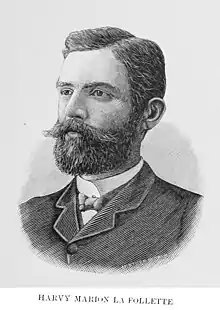Harvey Marion LaFollette
Harvey Marion LaFollette (September 8, 1858 – September 20, 1929) was an Indiana teacher and educator who, as a young man,[1] served two terms as Indiana Superintendent of Public Instruction.[2] He then moved to Tennessee where he established the town of LaFollette, Tennessee. His company, LaFollette Coal, Iron and Railway Company, would eventually employ more than 1500 people and was the largest blast furnace in the southern United States.[3]

Early life and education
Harvey M. LaFollette was born in Primrose, Wisconsin. His first cousin, Robert Marion La Follette, Sr., was three years old at the time and living on the adjoining farm. Harvey's father (also named Harvey M. LaFollette)[4] was a farmer and served in local government both as sheriff and commissioner. When Harvey was two years old, his family relocated to join relatives in Thorntown, Indiana. Harvey's brother, William La Follette, was born shortly after they arrived in Indiana. When he was seven years old, his father was killed in an industrial accident while working on a piece of machinery in the flour mill he owned.
Young Harvey was always an avid reader, and after studying at the nearby Friends School and a short stint at Wabash College he left for France, the land of his Huguenot ancestors, to continue his education. He studied in Paris at several institutions focusing on languages and civil engineering.[5] He left Paris, travelling on foot and staying with peasant families to better understand the local dialects. He took additional courses in Germany and in Italy. He returned to Indiana in 1880 a well-educated and travelled young man. He spoke five languages fluently.
Indiana educator
He began teaching in the public schools as soon as he returned from abroad and became a school principal and a county superintendent before running for statewide office at the age of 28. He was elected to two terms as Indiana Superintendent of Public Instruction.[6] In this job, he established a number of reforms as he standardized the textbooks and regularized the financial systems.[7]
LaFollette, Tennessee
Along with his youngest brother, Grant LaFollette, Harvey then moved some 400 miles (640 km) to the south and purchased more than 37,000 acres (150 km2) of land in the Tennessee mountains. He established and served as president and general manager of a company that eventually employed 1,500 people and became the largest blast furnace in the southern United States. He built a railroad that allowed his product to be shipped. The town that grew up around his business venture was named LaFollette in his honor[5] and became the county seat of Campbell County.[8]
Personal life
Harvey built and lived in Glen Oaks, a twenty-seven–room mansion in the center of LaFollette designed by the Knoxville architect George Franklin Barber. The home is on Indiana Avenue and is listed in the National Register of Historic Places.[9] As his company grew, he travelled extensively and remained close to his extended family. During the glare of the Wisconsin governor's race of 1900, his mother and older brother and sister returned to Primrose with cousin Robert and other family members to visit the old log cabin where Harvey was born and to relive memories of the pioneering days of a half century earlier.[10] During the next decade Harvey and his wife were often in Washington D.C. visiting family members and meeting political allies. Vice President Charles W. Fairbanks was a friend from his younger days in Indiana.[11] His brother and cousin both moved to the nation's capitol as members of Congress, and he visited them often. Later in his life, when the mines no longer produced and his business failed, he returned to his academic roots corresponding with Abraham Lincoln scholar Louis A. Warren, who wrote The Lincoln and LaFollette Families in Pioneer Drama,[12] a history of the Lincoln and LaFollette families on the Kentucky frontier in the years before Jesse LaFollette and Thomas Lincoln took their families across the Ohio River to settle in Indiana Territory.[13]
Family
He was a member of the La Follette family. William La Follette was a younger brother. Robert M. La Follette, Sr. was his first cousin. William Leroy LaFollette, Jr. and Chester La Follette were nephews. Suzanne La Follette was a niece. Mimi LaFollette Summerskill was a grand niece. Her son was political leader Richard L. Wright. His only child, Warner Marion LaFollette predeceased him. Harvey was visiting his brother, William, in Colfax, Washington when he died in 1929.[5] Both he and William and other LaFollette family members are interred in the Colfax cemetery in Whitman County, Washington.[14]
References
- http://www.rootsweb.ancestry.com/~inboone/Photographs/photos/lafollette_harvy_marion.jpg
- http://www.rootsweb.ancestry.com/%7Einboone/biographies/biography_lafollette_harvey.htm
- "Archived copy". Archived from the original on 2008-05-16. Retrieved 2010-04-02.CS1 maint: archived copy as title (link)
- "LAFOLLETTE, Harvey Marion". homepages.rootsweb.ancestry.com. Retrieved 2016-04-09.
- "Death Claims H. M. La Follette". Spokane Chronicle. Spokane, WA. September 20, 1929. p. 5. Retrieved October 30, 2020 – via Newspapers.com.

- Annual Report of the Department of Public Instruction of the State of Indiana. 1886-01-01.
- Annual Report of the Department of Public Instruction of the State of Indiana. 1890-01-01.
- Allison, John (1905-01-01). Notable Men of Tennessee: Personal and Genealogical, with Portratis. Southern historical association.
- "Archived copy". Archived from the original on 2007-10-10. Retrieved 2007-10-10.CS1 maint: archived copy as title (link)
- Barton, Albert Olaus (1922-01-01). La Follette's Winning of Wisconsin (1894-1904). Homestead Company.
- "The Frankfort roundabout. (Frankfort, Ky.) 1882-1908, February 22, 1908, Image 6". 1908-02-22. p. 6. ISSN 1941-0727. Retrieved 2016-04-09.
- Lewis A. Warren (June 1929). "The Lincoln and La Follette Families in Pioneer Drama". The Wisconsin Magazine of History. 12 (4): 359–378. Retrieved April 9, 2016.
- "The Sculptured Panels - Lincoln Boyhood National Memorial (U.S. National Park Service)". www.nps.gov. Retrieved 2016-04-09.
- "Colfax Cemetery - Surnames K-M - Whitman County, Washington". www.interment.net. Retrieved 2016-04-09.